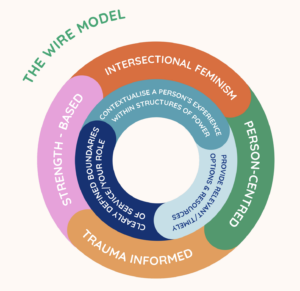WIRE interview on 3CR Community Radio
Listen to the recording to learn more about WIRE and the services we offer to ...
It’s easy to imagine WIRE’s phone room as some kind of transactional call centre. It’s in the name. Recently though, I had an afternoon in the phone room as a part of team induction, and quickly discovered that it was so much more than that.
The WIRE Model has been developed over many years (this year is our 40th birthday) and is quite unique in its ability to offer a supportive, empowering service without being ‘case workers’. Sometimes we never speak with that person again. All information is confidential – we rarely collect names or contact details of callers unless it is to send something out to them.
But by following the WIRE model, our staff and volunteers are not only calm and present, they’re able to support callers to speak openly about their issues and feelings through meaningful conversation that offers respect and affirmation.
Without giving too much of the magic away, the WIRE model consistently works through three phases.
Before the nitty gritty of the phone call starts, we invite meaningful conversation by giving respect and affirmation. We ensure that our staff are feeling safe and supported as well as the caller.
A key benefit of this starting point is that it allows for a person to talk freely, but also for the team member to and caller to reach a shared understanding and agreement regarding the caller’s needs and aspirations. This keeps the call on track whilst still being meaningful, giving respect.
In this phase we support the caller to summarise and prioritise key issues and feelings, recognising they are the expert of their own life. This a key element of WIRE training and our core belief – the caller’s experiences as a person are influenced and shaped by their gender, race, class, sexuality and ability under patriarchy, and there is no place for judgement.. It is also important in this phase to ascertain the caller’s existing supports, their general geographical location and their financial capabilities before we put them on hold and go through our extensive database to put together a list of information and referral suggestions.
Knowledge empowers you to have genuine choice and control in your life. After the phone support person and the supervisor have gone through the caller’s needs and aspirations, they return to the call to provide knowledge so the caller can make an informed decision. This is not just about giving them a list of numbers from a database, but also discussing how the referrals fit within the broader service system and exploring any possible issues with accessing referrals.
Before finishing up the call, the WIRE phone support person reinforces that the caller is not alone in their experience and that many people have had similar experiences. This is not to dismiss their issues, it breaks down the isolation and comes from a place of our own experiences, having been an information and referral exchange for 40 years.
The first call I sat in on was a single mother who was the primary carer for an elderly parent and primary school aged child with autism. She was primarily calling because the house she rented was not up to scratch and she was feeling threatened by addressing this situation with her estate agent because of the extreme housing shortage in her area. She has some savings but her only income is income support from the carer’s pension.
She wanted to have a better understanding of her options regarding approaching her real estate agent – what was legally the owner’s obligation? How was she protected by legislation?
Secondly, for the foreseeable future her sole income was going to be a form of Centrelink support payment and whilst she had some savings left over from her divorce, she didn’t want to risk dipping too much into that – given that she may not be able to recover from that with earned income any time soon if at all.
Upon listening and reaching a shared understanding with the caller regarding her needs and aspirations, the WIRE phone support person put the caller on hold to explore some options and referrals with their supervisor, making notes and gathering contact information from our database about the organisations that the caller may wish to approach following the call. Here is what was offered in line with the caller’s priorities;
When the caller hung up, the phone support person and supervisor had their own debrief on any feelings that may have come up during the call. This helps prevent burn-out, an issue prevalent in our sector.

This is our point of difference and why the WIRE model deserves to be supported.
Our model is also supported by other employers who comment on how WIRE trainees have a reputation for being the best listeners and leave judgement at the door. When a volunteer signs up, they participate in a ten-week training course (1 day a week for 10 weeks), followed by observation shifts, evaluation shifts and probationary shifts with the support of the team. After this there is generally a commitment to 4 hours a fortnight for 12 months of volunteer service. Some stay on and some take these skills to other organisations. All–in–all though, it is a special model that we’re all extremely proud of.